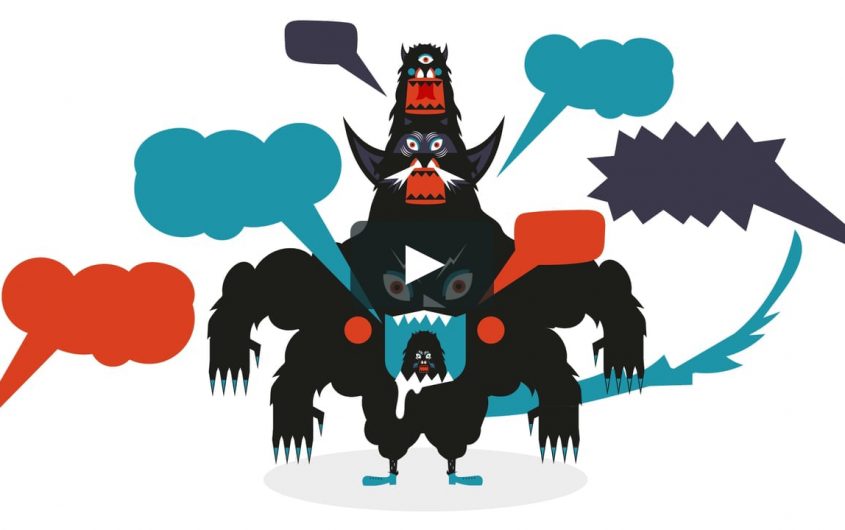
Creative Commons
A New Responsibility for Internet Platforms: Germany’s New Hate Speech Law

Mikayla Appell
Mikayla Appell is a research intern at AICGS for the spring of 2018. She writes for the AICGS Notizen Blog, conducts research for current projects and resident fellows, manages databases, operates the front desk, and helps organize and document events.
Currently, Ms. Appell is pursuing a master’s degree in International Affairs at American University’s School of International Service, with a regional focus on Europe and Eurasia. In her program, she concentrates on issues of foreign policy and security, and has particular research interests in European defense and international security cooperation.
Ms. Appell holds a Bachelor of Arts degree in Strategic Communication and German from Temple University, where she also minored in Political Science. During her tenure at Temple, she spent a semester studying German language and literature at the University of Hamburg.
As Germany rang in the new year, a controversial online hate speech law came into full effect. The Netzwerkdurchsetzungsgesetz (NetzDG), or the Network Enforcement Act, requires internet platforms with more than two million users to have reporting systems for hateful posts and to delete reported content if found to be illegal under the German Criminal Code[1]. Social networks are required to delete offensive material within 24 hours of a complaint, or after seven days for more legally ambiguous content. Failure to comply with the law could lead to fines of up to €5 million for the responsible individual or €50 million for companies. The law went into partial effect in October 2017, with a three-month grace period for companies to install new complaint management systems. With these systems now in place, the deletion of flagged content is mandatory.
The intention of NetzDG is to mitigate the amount of hate speech spreading throughout the internet. However, the implementation of this law has received criticism from both sides of the political spectrum. Referring to the issue with the account deletion of the satirical magazine “Titanic,” the Free Democrats’ (FDP) general secretary Nicola Beer argued that “private companies cannot correctly determine whether a questionable online statement is illegal, satirical or tasteless yet still democratically legitimate.” She supports the FDP’s proposed law to give the right to an authority to enforce the rule of law online rather than handing that responsibility to private companies. Chairwoman of the Green Party Simone Peter criticized NetzDG because she believes “it is not acceptable for US companies such as Twitter to influence freedom of expression or press freedoms in Germany.” The Left Party joined in the argument against NetzDG with the parliamentary leader Sahra Wagenknecht stating “in a constitutional state, courts rather than private companies make decisions about what is lawful and what is not.”
Germany is no stranger to hate speech laws. Post-WWII, Germany implemented many strict laws targeting hate speech and violence against minorities, which includes fines or jail time for Holocaust denial. However, in more recent years of rapid digitalization, online accountability has been a pressing issue, due to issues of online law enforcement and conflicting views on internet freedom. As a result of the influence of social media on recent elections and the polarization of political opinion and civil unrest, the need for the containment or eradication of hate speech and fake news online has been brought to the forefront of national and international debate.
NetzDG is Germany’s response to this debate. With increased racism and violence against minoritiesexperienced after the influx of refugees into Germany, lawmakers have worked toward solutions that may mitigate the spread of hate and the incitement of violence. The architect of the law, Justice Minister Heiko Maas, believes this law is necessary after years of increased pressure on social media platforms to take responsibility have not achieved the intended outcomes. Despite harsh criticisms against the law, Maas defends it by asserting that the internet cannot be unregulated, and the protection of illegal hate speech must not be tolerated.
Recent events have emphasized the span and strength of the internet, both the positive and negative effects it has on societies. What makes this such a difficult question to answer is the fine and often blurred line between freedom of expression and hate speech. Furthermore, the internet is a platform without borders. The effects of internet regulation will have impacts abroad, as will the publication of hate speech online. As governments would with any other transnational issue, countries should work together to find reasonable and effective solutions to this problem.
Even when one disregards the international significance of the internet, Germany must still abide by its own laws. Germany has laws against hate speech that stem from the consequences of WWII. These laws are enforced to prevent the incitement of hate or violence against identity groups. The enforcement of these laws is ever more critical given the backlash of hatred against migrants. The digital age has provided a new sector of life that exists online. However, the internet is not a lawless place. Germany must uphold the rule of law in all sectors, which includes the internet. NetzDG does not prohibit or punish German citizens for posting hateful comments online. It puts the responsibility on the internet platforms to keep only legal content on their websites. It is the responsibility of these companies to delete any illegal content because they are the owners of that content, despite many individual users of their platforms being the ones who write and post on these platforms. The internet may be a free space, but the social platforms people use on the internet are not; they are private companies that must abide by the law, especially when they have so much influence over society.
There is the argument that this law bypasses standard legal procedures and allows companies to censor German citizens. However, companies that own the content are only deleting content that is obviously illegal under German law, including threats and direct incitement to violence. The more disputable posts can be taken before the court to decide the legality of the statement and whether the post should be deleted or reinstated if the writer of the post wants to defend his or her deleted post. However, this can be a long process. The danger of online hate speech has been exemplified in recent years. It is quick to spread, and by the time a court decision may come about, the damage will have already been done. NetzDG will not be able to wipe the internet clean of any hateful comments, but it can mitigate the amount of hate speech before it spreads and causes irreversible damage.
[1] Section 130: Incitement to hatred
(1) Whosoever, in a manner capable of disturbing the public peace
-
incites hatred against a national, racial, religious group or a group defined by their ethnic origins, against segments of the population or individuals because of their belonging to one of the aforementioned groups or segments of the population or calls for violent or arbitrary measures against them; or
-
assaults the human dignity of others by insulting, maliciously maligning an aforementioned group, segments of the population or individuals because of their belonging to one of the aforementioned groups or segments of the population, or defaming segments of the population,








